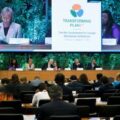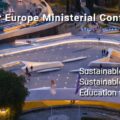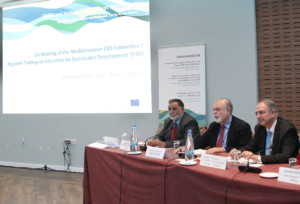“Our commitment to Education for Sustainable Development (ESD) is deeply rooted in the belief that education is the cornerstone of sustainable development and should be set at the center of learning,” said Athena Michaelidou, Minister of Education, Sports and Youth, while delivering on Thursday her welcoming remarks at the opening of the MED-9 High-Level Forum on Education for Sustainable Development and Green Transition in the Mediterranean Region.
While addressing later the First Session of the MED9 Ministerial Summit, in Limassol, Michaelidou also noted that Cyprus is an “exemplary case of integrating ESD holistically” and is considered a leading country in the field of ESD since 2008.
More than 450 attendees form 45 countries have gathered in Limassol to attend the Forum of the United Nations Economic Commission for Europe (UNECE) on ESD, themed “Empowering Youth for Sustainable Futures: Entrepreneurship Education and Youth Engagement” and the MED9 Ministerial Summit for the Education for Sustainable Development and Green Transition in the Mediterranean Region, taking place on June 27-28 in Limassol. Michaelidou noted that “both high level events are highlighting our commitment to advancing sustainable development through education”.
The Minister said that the EUNECE forum “underscores the importance of fostering innovative and entrepreneurial mindsets among young people, enabling them to become proactive agents of change”, while the MED9 Ministerial Summit “aims to explore the pathways to establish education as the key driver for change.”
In her address, Michaelidou spoke of the key objectives of these meetings in fostering partnerships and collaboration among countries, international organizations, development agencies, and other stakeholders, promoting innovation and entrepreneurship through ESD, and developing a comprehensive roadmap for integrating ESD into national educational frameworks.
The Minister noted that the two international meetings serve as a platform for building lasting relationships and fostering a spirit of cooperation among the participating countries. “By sharing best practices, reflecting on achievements, and learning from one another, we can strengthen our collective efforts and inspire further innovation,” she continued.
She, also, mentioned that teachers’ professional development and improvement of infrastructures at schools by rendering the school buildings more energy-efficient and by creating green spaces in schools are among the Ministry’s priorities.
Concluding, Michaelidou said she was confident that discussions during the meetings will be fruitful and underlined that Cyprus “is a living example of the potential for harmonizing tradition with innovation and sustainability.”
Tatyana Molcean, Executive Secretary of UNECE, underlined that UNECE and Cyprus have managed to achieve a milestone in the direction of implementing ESD and added that Cyprus has had a leading role in promoting this agenda forward.
She also expressed her satisfaction with the fact that there have been very practical steps towards the goals that have been set, with the establishment of the UNECE youth platform, noting that the platform encourages meaningful youth participation. She mentioned moreover that there will be a youth summit in the future, noting the importance of youth engagement and for the youth to have a voice that will be taken into consideration in policy making.
Molcean concluded her address by saying that the collaboration of many international institutions and countries in the meetings indicates “good intentions” and underlined the importance of creating synergies to achieve goals.
Christofer Castle, Director of the Division for Peace and Sustainable Development of UNESCO, noted in his address that young people want to contribute to the resilience of their communities and added that they are stepping up to contribute to sustainable solutions, in face of the current international and regional challenges. He explained that ESD aims to “empower individuals and communities to make informed decisions and take responsible actions for environmental integrity, economic viability and a just society.”
Castle also mentioned that ESD “engages the head, the heart and the hands” to promote creativity, critical thinking, and problem-solving skills and underlined that learning should be interdisciplinary, to cover a broad base of topics, to allow learners to be independent, self-reliant and embrace entrepreneurial thinking.
“ESD can influence entrepreneurship education to cultivate entrepreneurs who are not only driven by profit, but also committed in creating positive environmental, economic and social impact for a sustainable future,” he added. He underlined that education must change quickly, to create a peaceful and sustainable world.
Sylvie Motard, Deputy Director Europe, United Nations Environment Program (UNEP) noted in her address that Ministers and heads of education reaffirmed the importance of further strengthening ESD two years ago in Cyprus. “We need to invest in and with youth now, not in the future,” she said, and added that “we need to rebuild, regenerate, restore and vitalize educational systems now.”
Motard underlined that there is a sense of urgency in the call for action and said that she hopes that governments will respond to this urgency. She also said that the future, the livelihood, the security of young people is compromised because of global challenges and concluded that “we need to design and co-create together with young people, to ensure a position in a sustainable, resilient and inclusive society.”
Frederic Berthoud from the State Secretariat for Education, Research, and Innovation of Switzerland noted in his own remarks that “entrepreneurship is about transforming ideas into reality, addressing challenges with creativity, and fostering economic and social progress.” He also said that critical thinking, in today’s challenging environment is a driver for change.
He underlined the need to provide the youth with skills that will make them act as change-makers, problem-solvers, and visionaries. “By fostering entrepreneurship and embedding the principle of ESD in our educational systems, we can build resilient economies,” he said.
Participants list challenges that need to be addressed
—————–
Addressing the discussion at the First Session of the MED9 Ministerial Summit, the Minister Athena Michaelidou, noted that Cyprus is considered a leading country in the field of ESD and has integrated this subject since 2008 through the National Action Plan for Education for Environment and Sustainable Development (NAPEESD).
She also added that “Cyprus is the only country in the world that is recognized as an exemplary case of integrating ESD holistically and for establishing a permanent Unit for Education for Sustainable Development within the competent ministry.” Furthermore, the Minister noted that Cyprus chairs the Mediterranean Committee on Education for Sustainable Development (MCESD).
Michaelidou spoke of the main priorities of the Ministry, which include the revision of the ESD curricula, the establishment of the Whole School Approach, which aims to transform schools from knowledge-based institutions to open learning communities, the development of a certification scheme for sustainable schools, and the creation of green learning spaces and sustainable school infrastructures.
The Minister also mentioned the challenges that need to be dealt with, including the implementation of holistic school approaches at all levels of education in matters of sustainability and green transition, the utilization of digital education and the strengthening of the digital capacity of teachers and students, the further development of non-formal education and the promotion of intergenerational communication programs, and the development of programs that will connect the school with the labor market.
“The Mediterranean Strategy on ESD, which was renewed and endorsed at the 9th Ministerial Meeting here in Cyprus in 2022, plays a vital role in addressing these challenges,” she concluded, underlining the need for joint action, regional cooperation and sharing of best practices within this framework.
Tatjana Hema, UNEP MAP Coordinator, underlined in her introductory remarks the importance of the implementation of sustainable practices and activities in schools, as well as the development of new ESD curricula for the protection of natural resources, as a crucial part of green transition.
She also noted that there is already evidence that the countries in the region are taking this goal seriously and mentioned that 73% of the countries have already established a relevant regulatory framework. Hema added that national education policies, new curricula, teachers’ education, and students’ assessment are important aspects of ESD implementation and also noted the importance of the interdisciplinary approach in education.
Almotaz Abadi, Deputy Secretary General of the Union for the Mediterranean, referred to data issued by the World Bank, according to which, by 2030 we will have a 40% gap between demand and supply in the water sector and a 35% gap in the energy sector. Abadi underlined the alarming nature of such data and added that “it is our choice to start thinking out of the box.” He noted the need to change regulations and policies, not only on a national level, but also between nations.
“ESD is not a luxury, it is the education for the only future we can imagine,” said Professor Michael Scoullos in his introductory remarks at the session. He spoke of the challenges due to climate change, continuously increasing temperature, consecutive high temperature records, increase in flood events and destructive fires, and irreversible changes in the Arctic, which is the fastest warming part of the world.
Scoullos also underlined the role of Cyprus for the revision of the action plan, following the UNECE Ministerial Summit for the Environment in Europe, which took place in Nicosia two years ago. He noted that some of the actions proposed by the regional programs of the action plan include school twining and mobilizing youth activities, as well as actions in higher education and for journalists.
The MED9 Ministers discussion followed, focusing on the implementation of ESD in the educational systems of the Mediterranean countries, while addressing questions regarding the priorities and the challenges ahead.



